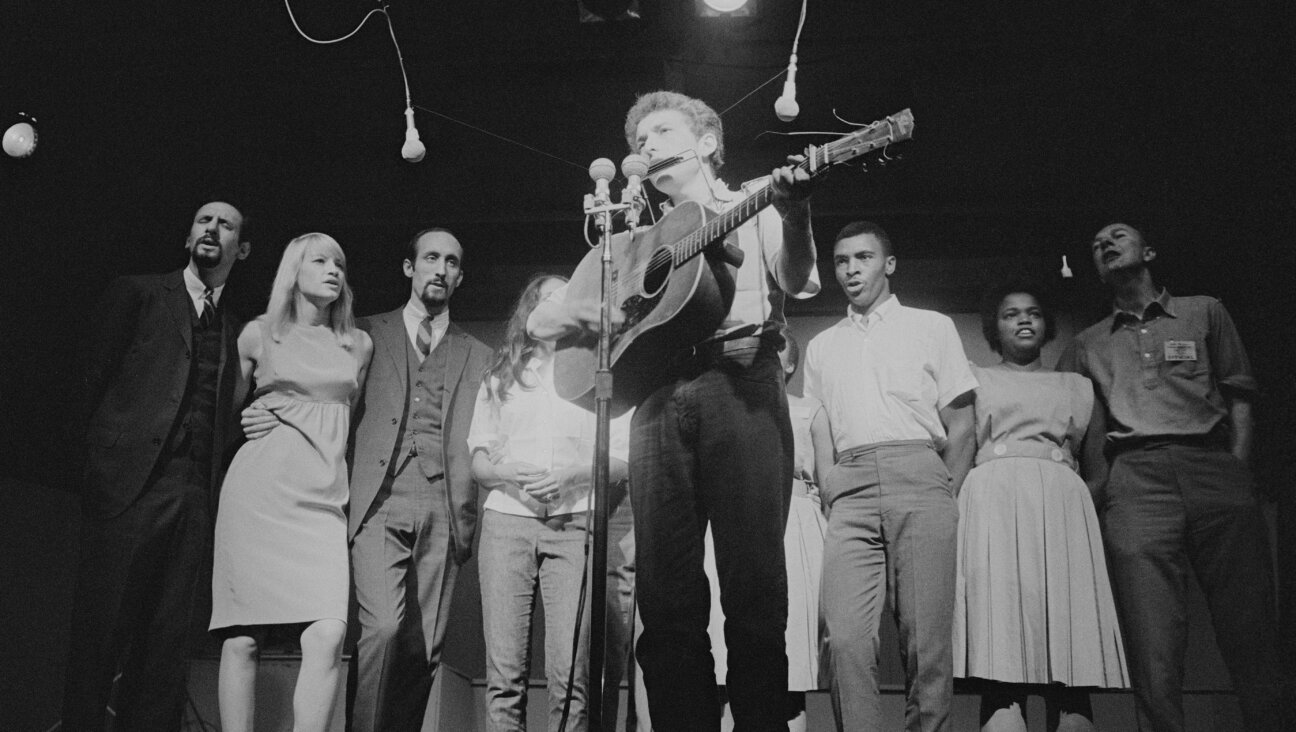Why Ezra Furman Is Proudly Frum — and a ‘Dress-Wearing Weirdo’ at the Same Time

Image by Courtesy Brid Walpole
‘I really like Ezra Furman. I think the guy’s got something. He’s got a lot of wit and nerve.”
That wasn’t a stray Facebook comment or online review. It was punk godfather Iggy Pop raving over newly minted indie-rock royalty on a BBC Music broadcast last month.
The object of Pop’s adoration is a bisexual, dress-wearing “weirdo,” whose jittery, angular tunes mash up personal confessions, sharp literary references and often-disturbing glimpses of mental deterioration. Furman’s even dubbed his website “A Guide for the Perplexed.”
In case Furman wasn’t complex enough, he’s also an observant Jew who’s built a punishing tour and recording schedule around Shabbat and holidays. With raves pouring in for Furman’s new album, “Perpetual Motion People” (Bella Union), the Forward’s Michael Kaminer caught up with him by email from his Oakland home.
Michael Kaminer: Every story about you seems to struggle with the identities you encompass or even what kind of artist you are. How do you define yourself?
Ezra Furman: Journalists are looking for stories, and the most obvious story with me lately is that I often dress in a feminine way. That most visible quirk leads them to the fact that I am bisexual. Then when they hear that I am an observant Jew, they think, now this guy is unusual. All of it’s kind of ancillary to what I’m trying to present, which is a coherent artistic world based on songs and sounds.
I think of myself as someone who’s trying to be a great songwriter and a great performer. And I mean really great. I have this idea of greatness in my head that I’ve formed from listening to an absurd amount of records and going to shows. And that’s what I care about; that’s what I’m going for. It has to do with capturing something real about human life at this time in history. What it means to be who I am, which is a privileged weirdo with big spiritual and mental drama and no real external problems. But also someone who is trying to rise above the muck and mundanity and really live, really glow.
The Guardian mentioned the Velvet Underground and Jonathan Richman as two of your “heroes.” You’ve mentioned Lou Reed as “another Jewish, suburban musician in love with early rock ’n’ roll.” Do you fit into a Jewish rock lineage? Who else would be in there?
The list is long and prestigious. Joey Ramone, Carole King, Bob Dylan, Randy Newman, Leonard Cohen. Jews like to write and sing. In America, a lot of us have been eager to show that we’re part of American culture. But it all goes back to King David writing Psalms. That’s what I want to do. Honest emotional work with the power to lift up the downhearted.
It’s unusual to hear about a touring indie rock musician who tailors his schedule around Shabbos. How much are you willing to compromise your Jewish observance for success, if the business demands it?
Since starting to consistently keep Shabbat — and it’s only been about a year of total consistency — I have been unwilling to compromise on it. I am lenient in some small ways since I am still easing back into it and almost no one I know does it; certainly no one in my band does. But as far as I can tell, I’ll never play a show on Shabbos again, or travel from town to town. It’s too important and too beautiful. The more I do it and the more I put my heart into it, the more that becomes clear.
Your mother converted, and it sounds as though you grew up in a very Jewish household. Can you tell us a bit about your growing-up years?
I grew up attending a Conservative day school, Solomon Schechter, until I was about 14, and going to a Reconstructionist synagogue. My parents’ goal was not to make their kids observant, but to cause us to be educated. They wanted us to be able to know what was going on when we chose to go to services or do ritual observances or et cetera.
At Schechter, we davened every morning and learned Hebrew and studied Torah. When I went to public high school, I thought I’d leave all that behind. But I got back into it on my own terms a couple years later. Once I learned some more about it, and especially when I started reading Abraham Joshua Heschel, I realized how much there was to it, and how very drawn I was to it. So began my off-and-on observance and study. By now, I’m pretty sure I’m in it for the long haul.
Your brother is also a musician. How have your parents responded to your career choices?
I almost can’t imagine how parents could be more supportive that ours have been. They worry about our livelihood, but they never discourage us. They come to as many shows as they can. And I borrowed their minivan to tour around America for about three years. Then they loaned me some money to buy my own van. They’re the sweetest, and I’m so lucky for it. Oh, by the way: Hi, all my parents’ friends. Can you believe I’m in the Forward?
Almost every review refers to you as an outsider. That’s also a very Jewish concept. Did you set out to play that role?
My main theme as a songwriter seems to be a feeling of homelessness, of being in motion. The feeling of being somehow unmoored, a radical internal freedom that is very painful and also joyful.
When I first started to really love music, around age 12, that’s what I loved about it. I loved the punk records that suggested that my being a misfit was actually a good thing. To lean into your pain and to draw a sense of freedom from it is the best thing you can do as an outsider. Then you can share that freedom, that positive energy, with other people who feel like outsiders.
What kinds of reactions do you get to your onstage wardrobes and makeup? And who styled you for the “Perpetual Motion People” cover?
People say all kinds of stuff to me about how I present myself. Most of it’s positive. I really don’t care about what anyone says unless they are also gender-nonconforming. Then I really listen. I love the solidarity felt between us gender failures.
For the cover, I just wore something I thought looked good. I may have had a friend help me out with the eye makeup. I’m still not great at eye makeup. And a fan gave me the flower I wore. They pinned it onto my blazer after a show in my hometown, Evanston.
You’ve talked about living a life that’s “consistent” and being “a good Jew.” What does that mean?
I think my grandfather told my mother to be a “good Jew” when she converted. For me, being observant is a way to be aware of the grandeur of life and the moral opportunities and pitfalls that present themselves at every turn.
I believe the goal of all Jewish observances is to make you into a person who is constantly conscious, really radically conscious. Saying prayers and blessings all day, living in a disciplined way — these refine your character and continually wake you up. They remind you that you are fragile and powerful and the very fact of existence is utterly amazing. Habitual transcendence is my aim, and if I’m not consistent with the practices that take me there, I know I will fall back into this less aware, more deadened way of behaving and thinking.
How hard — or easy — is it to get as confessional as you do in songs, especially around some of your personal challenges?
It’s hard to write good songs of any kind. But I can’t seem to keep from making them confessional. I aim for truth, and my personal truths are the most accessible to me, though I am trying to get better at capturing larger, transcendent truths. Again, I’m shooting for greatness. And any sense of embarrassment I have at getting personal can only be holding me back.
















